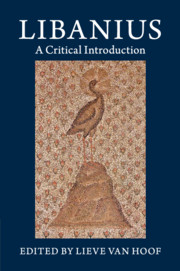Book contents
- Frontmatter
- Dedication
- Contents
- List of tables
- Notes on contributors
- Preface
- Abbreviations
- Introduction: Libanius at the margins
- Part I Reading Libanius
- Chapter 1 Libanius’ Life and life
- Chapter 2 The historical context: the rhetoric of suffering in Libanius’ Monodies, Letters and Autobiography
- Chapter 3 The rhetorical context: traditions and opportunities
- Part II Libanius’ texts: rhetoric, self-presentation and reception
- Part III Contexts: identity, society, tradition
- Appendices: survey of Libanius’ works and of available translations
- References
- Index locorum
- General index
Chapter 3 - The rhetorical context: traditions and opportunities
from Part I - Reading Libanius
Published online by Cambridge University Press: 05 October 2014
- Frontmatter
- Dedication
- Contents
- List of tables
- Notes on contributors
- Preface
- Abbreviations
- Introduction: Libanius at the margins
- Part I Reading Libanius
- Chapter 1 Libanius’ Life and life
- Chapter 2 The historical context: the rhetoric of suffering in Libanius’ Monodies, Letters and Autobiography
- Chapter 3 The rhetorical context: traditions and opportunities
- Part II Libanius’ texts: rhetoric, self-presentation and reception
- Part III Contexts: identity, society, tradition
- Appendices: survey of Libanius’ works and of available translations
- References
- Index locorum
- General index
Summary
Introduction
At the end of the first part of his Autobiography (Oration 1), published as a composition in its own right in 374, Libanius included a grand oratorical speech of Fortune, who spoke ‘as if in a play’. Libanius’ tutelary deity, Tychē, provided a convenient template that served to give unity to the whole of Oration 1 (§§1–155). The goddess served as the mouthpiece of the sophist and allowed him to present his life as a series of Thucydidean antitheses, an alternation of positive and negative events in breathless succession, ending with a half-triumphant assessment. Immediately before this ēthopoiia, in §154, the reality that Libanius painted was gloomy. He was a teacher of rhetoric but society no longer cared for that discipline. People who were greedy for money turned to rival studies – Roman law, Latin and stenography – that led to posts in the Imperial administration. Those who had money were lucky, but men of culture were despised. We often meet this bitter Libanius in his writings, a man disappointed in what he cared for most: rhetoric, the discipline he taught his students and his beloved ‘bride’. But there also is another Libanius, the man aware of his merits and proud of his accomplishments. This is the man (less visible in the writings of the later part of his life) who made Edward Gibbon comment in 1737 that the sophist had and ostentatiously displayed ‘a favorable opinion of his superior merit’. At the end of the first part of his Autobiography this proud man is revealed through the words of Tychē:
You had one thing from me that makes up for them all, that you composed so many orations and that they have a good reputation. During your life the numerous hands of your copyists (a cause of envy) have yet proved to be too few for the number of your admirers. Accordingly, every school of rhetoric shows that your works are equally in the hands of students and teachers (Oration 1.155).
- Type
- Chapter
- Information
- LibaniusA Critical Introduction, pp. 59 - 78Publisher: Cambridge University PressPrint publication year: 2014
- 1
- Cited by



